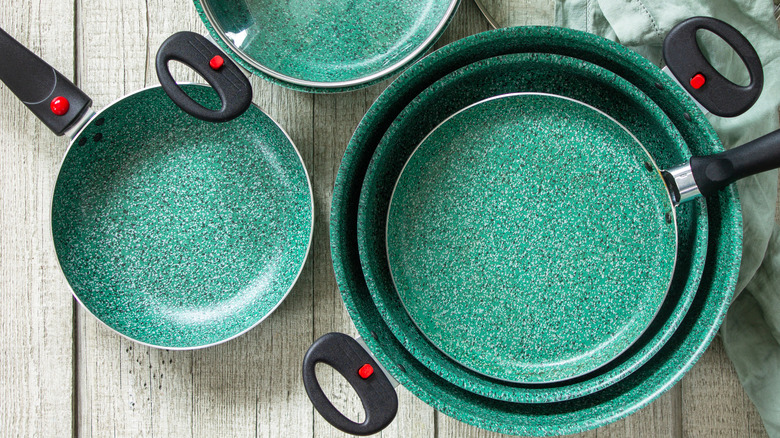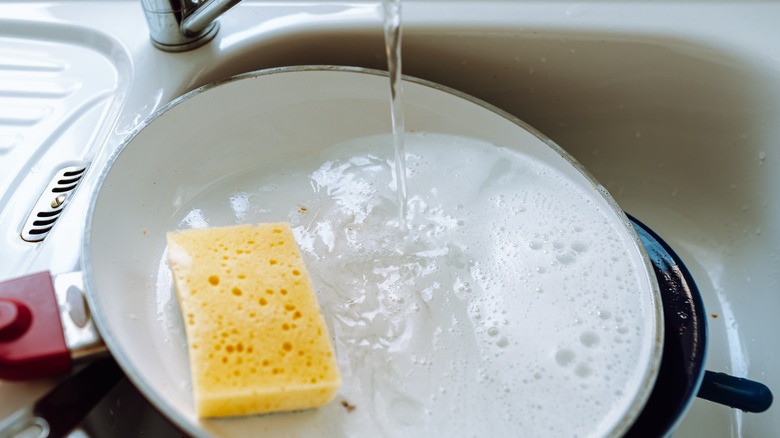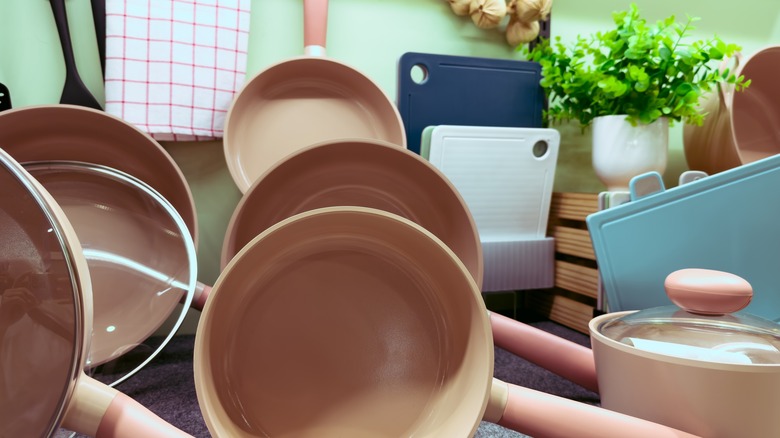How To Clean Ceramic Pans To Make Them Last Longer
Ceramic pans are an asset to any kitchen. Often brightly colored and beautiful to look at, they're also considered a more natural and eco-friendly alternative to the older style Teflon-coated nonstick pans. As well as being nonstick, they're lightweight, easy to move about on the stove, and they conduct and spread heat evenly, too, meaning your food cooks more uniformly. Pretty and practical — what a combination.
There's a difference between pure ceramic cookware and more common ceramic-coated pans, which we're talking about here. These don't actually contain ceramic but are named as such because of the shiny non-stick coating that covers the metal base. But as well as sometimes being expensive, these ceramic pans also have a notoriously short shelf-life. After a couple of years, the glossy coating can begin to deteriorate, and with it, the desired nonstick properties.
But with proper care, you can extend the life of your ceramic cookware, making it worth the investment. Things like washing ceramic pans by hand rather than in the dishwasher, using non-scratch sponges or soft cloths, using natural cleaning solutions rather than harsh chemicals, and avoiding sudden changes in temperature when washing your pans, can all help your cookware last a bit longer, around three to five years.
Hand wash ceramic pans with mild detergent or baking soda
When it comes to washing ceramic cookware, it should always be done by hand once the pan has cooled. Even if your pans say they're dishwasher safe, they'll last longer if you gently wash them manually after each use.
The best way to wash them is in warm water with a mild liquid detergent and a soft cloth or non-scratch sponge. Don't use any sort of abrasive scouring pads or steel wool, which — just like using metal utensils (as opposed to silicone, wooden, plastic, or nylon) — can scratch the surface of the coating. Using something harsh will affect its nonstick abilities, as well as reduce the lifespan of the pan. After washing, let the pan air-dry or gently dry it with a soft towel.
Even if you have any tough, burnt-on bits of food, you'll want to avoid the dishwasher and scourer — and don't use any harsh chemicals, either. Instead, try sprinkling baking soda onto the affected areas, working it in with a soft, damp sponge, and then gently rubbing the grime off with a soft, dry towel. Just as you can use baking soda to naturally clean your kitchen, it also helps to lift the dirt and grease from ceramic cookware.
Try vinegar for removing tough stains on ceramic pans
Just as you need to avoid any abrasive cleaning or cooking methods with ceramic pans, you'll also want to steer clear of any very sudden changes in temperature when it comes to washing them. This means letting the pan cool before washing it, to protect the nonstick layer. And don't soak a ceramic pan unless you're sure what the entire thing is made from and have followed the manufacturer's instructions. Just as you wouldn't consider soaking a really dirty carbon steel pan, a ceramic-coated pan that is, for example, cast-iron beneath the coating should not be soaked, for risk of rusting.
To remove any tough stains that can appear over time and keep your pan looking newer for longer, try using a white vinegar solution of one part vinegar diluted with four parts water. For very stubborn stains, try pouring three percent hydrogen peroxide over the bottom of the pan. Leave it for about half an hour, and then rinse and gently dry the pan.
And remember, when stacking your ceramic pans after they've been washed and dried — place a pad or cloth between each one to avoid any additional marks or scratches in storage. Because the better you look after your pan, the better it will perform when cooking — and the longer it will last.



